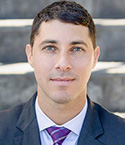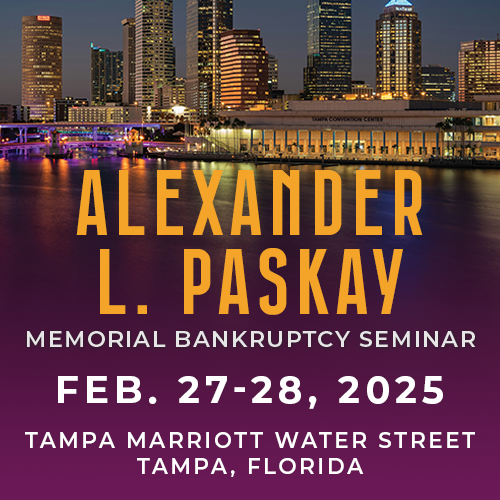| |
| Co-Chairs’ Corner |
| The Bankruptcy Litigation Committee had an outstanding year in 2024 thanks to our amazing members. From writing articles to speaking to volunteering time, our members are some of the most engaged in ABI. Thank you for everything you do! Here is a quick look back at the highlights of 2024.
This year’s Annual Spring Meeting featured an all-star cast of panelists. Hon. Bruce A. Harwood (ret.), Phil Denning (ICR Communications; New York), David G. Fine (Federal Bureau of Investigation Cyber Division; Washington, D.C.), William T. Repasky (Frost Brown Todd LLP; Louisville, Ky.) and Keith Wojcieszek (Kroll; Washington, D.C.) presented “The Impact of Business Email Compromise in the Bankruptcy Arena: Strategies and Tools to Protect Bankruptcy Participants.” Presented by the Bankruptcy Litigation Committee, the Commercial and Regulatory Law Committee and the Financial Advisor & Investment Banking Committee, this program discussed top-of-mind issues that every bankruptcy professional faces, and included fascinating FBI agent discussions regarding the latest intelligence
threats and preventative strategies.
In 2024, the Supreme Court covered a lot of ground in the bankruptcy arena. To keep our members up to speed, the committee presented an abiLIVE webinar titled, “Where’s the Supreme Court Going? Recent Decisions, Trends and Predictions.” ABI’s own Editor-at-Large Bill Rochelle moderated a panel of some of the country’s finest bankruptcy appellate experts: Reno Fernandez (Binder Malter Harris & Rome-Banks LLP; Santa Clara, Calif.), Hon. Craig T. Goldblatt (U.S. Bankruptcy Court; Wilmington, Del.), Prof. Christopher D. Hampson (University of Florida Levin College of Law; Gainesville, Fla.) and Prof. Robert M. Lawless (University of Illinois College of Law; Champaign, Ill.). The program was a hit and had more than 220 live webinar attendees.
|
| |
|
|
| Just recently, the committee partnered with the Real Estate Committee to present “The ‘F’ Word, from the False Claims Act to Ponzi Schemes: Practical Tips for Identifying and Efficiently Addressing Fraud in Bankruptcy Cases (and Beyond).” Panelists Prof. Laura N. Coordes (Arizona State University Sandra Day O’Connor College of Law; Phoenix), Patrick E. Fitzmaurice (Pillsbury Winthrop Shaw Pittman LLP; New York), Kevin G. Hroblak (Ice Miller LLP; Baltimore) and Kathy Bazoian Phelps (Raines Feldman Littrell LLP; Los Angeles) — each fraud experts in their own right —
presented a masterclass in dealing with some of bankruptcy’s most thorny litigation issues.
The committee’s newsletter was reinvigorated last year, covering topics from bankruptcy appeals to chapter 15. Please be sure to visit www.abi.org/membership/committees/bankruptcy-litigation for all of the latest content from our amazing authors, as well as recordings of this year’s presentations.
Finally, the committee has a few special projects currently in the works. Several Projects spent 2024 in the planning stages, and we look forward to their rollout in 2025. Coming off the heels of the Supreme Court’s Purdue Pharma decision, Special Projects Leaders Jennifer A. Christian (ASK LLP; New York), Nicholas D. Tally (Wilmington Trust; Minneapolis) and Isley M. Gostin (Wilmer Cutler Pickering Hale and Dorr LLP; Washington D.C.) will be focusing on mass tort issues in bankruptcy. Additionally, initial work has commenced for the writing and publication of a resource for judicial law clerks. Elizabeth Rogers (Landis Rath & Cobb LLP, Wilmington, Del) is leading this effort. While this project is in the early planning stages, it will be moving ahead with momentum in the coming year. Stay tuned
for these exciting projects and more in 2025.
We are excited about all the wonderful projects and events our committee is planning, and we enjoy it when our members are engaged. As always, if want to get more involved in the Bankruptcy Litigation Committee, please do not hesitate to reach out to the leadership team: John C. Cannizzaro (Ice Miller LLP; Columbus, Ohio), Sara L. Abner (Frost Brown Todd LLC; Louisville, Ky.), Danielle Mashburn-Myrick (Phelps Dunbar LLP; Mobile, Ala.), Jon J. Lieberman (Sottile & Barile LLC; Cincinnati), Mark A. Platt (Frost Brown Todd LLC; Dallas) and Dana L. Robbins-Boehner (Burr & Forman LLP; Tampa, Fla.). Thank you all! |
| |
|
| |
| Drag-Along Clause as a Tool to Sell Assets of the Company |
| In Poland, the rules for the transfer of shares in a limited liability company (LLC) are specified in the Commercial Companies Code (CCC). According to Article 180 of the CCC, [1] the transfer of a share, or a fraction thereof, must be in writing with notarized signatures. The company agreement may contain additional restrictions on the transfer of shares, such as the need to obtain the company's consent to their sale or the introduction of a preemptive right for other shareholders. If consent is required, the company's management board issues it in writing in accordance with Article 182 of the CCC. In a situation where the management board
refuses consent, the shareholder has the right to apply to the registry court for its issuance, provided that there are important grounds for doing so. |
| |
|
|
|
|
| |
|
| |
| Is Waiver of Service an Option in Adversary Proceedings, Where Nationwide Service by Mail Is Allowed? |
| After spending many painstaking hours finalizing your client’s claims, you have just filed a new adversary proceeding in bankruptcy court. It is now time to serve the summons and complaint. Hoping to avoid the hassle of identifying and mailing a copy to the defendant’s registered agent, you ask the defendant’s counsel whether she is authorized to accept electronic service on her client’s behalf. If so, you plan to simply email a copy of the summons and complaint to counsel. But instead of agreeing to accept service, defense counsel responds: “My client will waive service under Rule 4(d). Please send me the form.”
Wait — what? Of course, you know that Rule 4(d)(1) permits a plaintiff to request that a defendant waive service of a summons in a district court case, and that Rule 4(d)(3) provides that a domestic defendant who “timely returns a waiver need not serve an answer to the complaint until 60 days after the request was sent.” But do Rules 4(d)(1) and 4(d)(3) even apply in an adversary proceeding? The answer is surprisingly murky.
You read Rule 7004 again. Rule 7004(a) provides a hodgepodge list of specific Rule 4 provisions that apply in adversary proceedings. Also, Rule 7004(b) and (d) conveniently permit nationwide service of an adversary proceeding summons and complaint by first-class mail. But what about waiver of service? There are only two mentions of waiver of service in Rule 7004. The first appears in subsection (f), which provides: |
| |
|
|
|
|
| |
|







